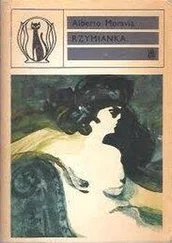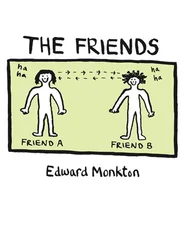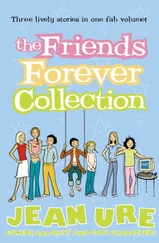I met Lalla in the offices of the Allied radio services, where I had gone seeking work. I had been involved in radio before the war, and now that I had no work, I had been told I might be able to find something there. She was a secretary in one of the offices. After I introduced myself, she said: “Please take a seat … I’m afraid you’ll have to wait a while.” I was struck by the frank, direct, almost aggressive tone of her voice and the look that accompanied her words, which I can only describe as provocative. It was Lalla’s normal expression, which she used with all men, but I did not yet know this; I assumed that it was meant for me and only for me. After I took a seat, as she suggested, I began to talk to her. She was very relaxed and forthright and had no problem telling me her name and age, and she soon began to tell me about the town where she was born and about her parents. We were alone in the office, a small room facing a courtyard. She sat at her desk, and every so often she would return to her work and type a few lines very quickly, after which she would again pause to answer my questions. She spoke sarcastically about her superiors who were American and British officers. Finally, as if resigning herself to the fact that she would get no more work done while I was there, she turned toward me on her chair and crossed her legs. I remember that I noticed for the first time how heavy and strong her legs were, like the rest of her body. With her large, coarse, and somewhat impure hands she opened a pitiful, threadbare purse, pulled out an American cigarette, and lit it. When she
159
noticed that I was staring at her legs, she pulled the hem of her skirt down below her knees. We continued to talk; I can’t quite remember what we discussed, nothing in particular. It was the kind of conversation dictated by desire, roughly equivalent to certain kinds of birdsong or animal calls. The substance was not important, and perhaps she did not even hear what I said, but my tone of voice came through and she must have felt it beating down on her like a ray of sun through a window. Finally she stood up. “I’ll go find out if the major can see you,” she said. As she walked across the room, I stared at her again and confirmed my first impressions of her. I could not help thinking that she was a woman of the people, down to her fingertips: provocative, vulgar, coarse. She was wearing ugly shoes with heels that were too high, an ugly, stretched-out skirt, and a loose sweater over a worn blouse. But in those threadbare clothes, the animal-like, aggressive quality of her beauty was almost more powerful. Her clothes surrounded her without touching her, it seemed; they were meant to be torn off, violently, in the fury of an amorous passion. As soon as she returned, saying “Not yet, you’ll have to wait a bit longer,” I grabbed her by the skirt, baring her thigh as I pulled her toward me. She did not pull away, and instead twisted her head to one side, rubbing her lips against mine, hard. Then she said, softly, “Let go … not here.” Her lips were covered in a dense, thick lipstick, and this was what got us into trouble. At that very moment, the door opened and the British major looked out. He saw me sitting, my mouth covered in lipstick, and Lalla standing in front of me, her skirt still in my hand and slightly raised, exposing part of her leg. Calmly, he said: “ Signorina , your services are no longer required.” He said the words in an objective tone, without reproach, as if dismissal were the automatic result of the lipstick on my lips. Then he closed the door. Lalla was upset, I suppose, but showed it for only a brief moment as she stood facing the door with a surprised expression. Then she shrugged. “Well, let’s go,” she said, heading straight for the coatrack, from which she took her hat and a small umbrella the size of a fan. Somewhat dejected, but still feeling excited and stimulated by her proud, aggressive attitude, I followed her silently as
160
she gathered her things, picked up her bag, and put on her jacket. “Sooner or later I was going to have to leave this dump,” she said, almost as if to console me and diminish my sense of guilt. When she was ready she opened the door. But before leaving, she took one final look at the office and said, “Good riddance.” We walked out into the hallway. I was still following her, feeling guilty and embarrassed, but also darkly aware that there was something strange, abnormal going on inside of me. She turned to look at me and began to laugh, almost ostentatiously, arching her shoulders and pushing her belly forward, in an almost provocative gesture. “Where do you think you’re going looking like that?” she asked. The hallway was empty, and the door that led to the bathroom was ajar. She opened it, pulled me inside, and closed it behind her, pushing me against the mirror. I saw then that my mouth and cheek were still covered in lipstick; it looked like a kind of ridiculous, obscene red mustache. “Were you planning to walk around the city like that?” she added, laughing. Now she was near me, and I could not help grabbing her skirt once again, pulling her toward me as I had earlier in the office. This time she did not protest. She stretched out her hand and shut the door, locking it from the inside. With her other hand she assisted me, unzipping her skirt, shimmying out of it and leaning forward, lifting her hips and opening her legs, grabbing hold of the edge of the sink and lowering her head, as if to rinse her hair with water. I took her like this, from behind and standing up, like a bull taking a cow or a stallion a mare, except that we were not standing in a field of flowers but rather in a narrow bathroom, in front of a mirror and a sink. There was no whispering brook, only the gurgle of pipes. But the sensation was the same, that of a concrete, sensual impulse, a physical communion so perfect that it transcended the limits of blood and the senses and touched our souls. I remember that even as I stood there, still holding her firmly, I kissed her face humbly, full of gratitude, and she did the same. Later, we walked in the street, and it felt as if we did not really know how we had ended up there, as if we had been walking in a dream or had flown out of the window.
Later that same day, Lalla went to her rented room,
242
gathered a few belongings in some boxes tied with twine, along with a tattered old suitcase, and moved into my room at the boardinghouse, where there were two beds. I had proposed the idea, almost timidly, and she quickly accepted, saying simply: “You made me lose my job … You ruined me … now you have to take care of me.” And thus began one of the most difficult, and also one of the happiest, periods of my life.
4) Version C, typescript p. 270
[ These lines describe Nella’s and Sergio’s feelings as they ride the bus to Maurizio’s house .]
[…]I was proud of her and of her beauty, and I wanted Maurizio to see her and admire her, just as I admired her at that moment.
Finally, when it was already quite late, we left the apartment and took a bus to Maurizio’s. He lived in a neighborhood which, twenty years earlier, had been one of the most elegant and modern in the city. Now other, newer neighborhoods had sprung up around it, so that what had once been practically a suburb had become almost part of the city center. On the bus I noticed that Nella seemed uncomfortable and avoided looking me in the eye. It occurred to me that as she reflected on what had happened earlier at home, she felt hurt, and I suffered a pang of guilt. As soon as we stepped off the bus, she said:
Finally, when it was already quite late, we left the apartment and took a bus to Maurizio’s neighborhood. Recently, new neighborhoods had sprung up around it, so that what had once been practically a suburb had become almost part of the city center. As the bus drove along, I became distracted thinking about Maurizio and our visit. Examining my feelings, I realized that I felt driven by an aggressive, pugnacious impulse, and at the same time I was tormented by a fear of not being up to the task at hand. It never occurred to me to think that this was just a simple visit, without particular significance, like so many others; I knew that this was not the case, and in a sense I was preparing myself for what I thought awaited me. But instead of analyzing my own feelings of inferiority toward Maurizio and consciously replacing those subjective feelings with objective goals — as one often does in such cases — I tried instead to analyze his superiority, which was all in my mind, and to discover his points of weakness. As I have said before, to me it seemed that Maurizio’s superiority sprang from his vitality, a quality that was mysterious and impossible to pin down, something I sensed but could not define. At the same time I believed that his social status was his greatest weakness; in other words, I believed that he belonged to a social class which I considered to be irreparably doomed. I realized that if I could impart this sense of doom, this fear […]
Читать дальше












